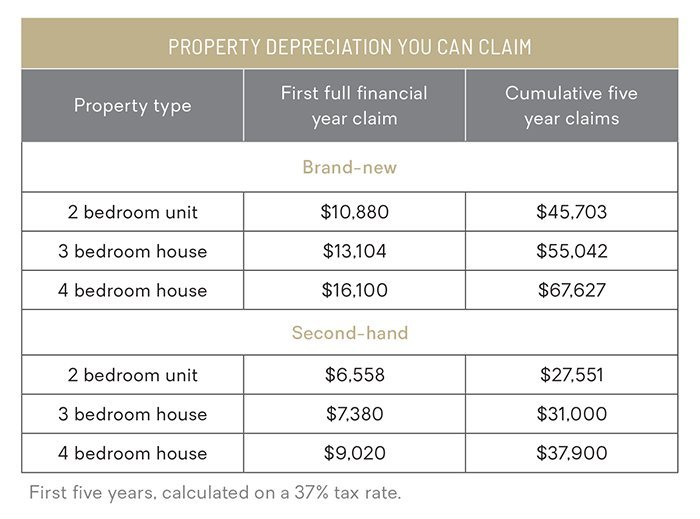If you're an Australian property investor, you'll want to make sure you're getting the most out of your investment. A property investment depreciation schedule can help you do just that!
In this blog post, we'll guide you through the ins and out of depreciation, what a depreciation schedule is and the benefits it can bring you – especially at tax time!
What is Depreciation?
Depreciation is an often overlooked but important aspect of owning an investment property, so it's important to understand how it works.
Depreciation is the biggest non-cash property deduction available to property investors because you don't need to spend any additional money to claim it, unlike other deductions where money needs to be spent like interest and insurance.
Depreciation is the second largest tax deduction available to property investors after loan interest, yet 80% of people fail to take full advantage of it.
Depreciation is the natural wear and tear of a property and its assets over time. While all properties depreciate, only property investors can claim it as a tax deduction. Depreciation allows investors to recover the cost of their investment property over time.
Tax depreciation deductions are split into two categories:
- Capital works deductions
- Plant and equipment depreciation
Capital works deductions refer to your building's structure and items that are permanently fixed within the property such as kitchen cupboards, doors and sinks. Capital works typically make up between 85-90% of the total deductions claim. Some example of items that can be claimed are:
- Built-in kitchen cupboards
- Doors, locks and door handles
- Clothes lines
- Bricks, mortar, walls, flooring and wiring
- Driveways
- Fences and retaining walls
- Sinks, basins, baths and toilet bowls
Plant and equipment assets are items which are easily removable or mechanical in nature – property owners can claim depreciation for the wear and tear of these assets.
Some example of items that can be claimed are:
- Air-conditioning units
- Blinds and curtains
- Hot water systems, heaters, solar panels
- Security systems
- Light fittings
- Swimming pool filtration and cleaning systems
Benefits of Claiming Depreciation
There are several benefits to claiming depreciation on your investment property, including:
- Reducing your taxable income
- Maximising your return on investment
- Lowering your tax liability
If you're looking to get the most out of your investment property, a property investment depreciation schedule is a valuable tool.
What is a Depreciation Schedule?
A depreciation schedule is a report that outlines all available tax depreciation deductions for a residential investment property or commercial building. Most properties, new and old, have depreciation available.
A well prepared schedule can provide you with a 40 year forecast illustrating all depreciable items along with both prime cost and diminishing value methods of depreciation to help you decide which method is best for you.
You may also be able to claim back missed dollars by adjusting previous tax returns if your depreciation schedule identifies deductions you may have missed or haven't claimed previously.
A property tax depreciation schedule lasts the lifetime of the property and is available for a one-off fee is 100% tax deductible.
It is highly recommended you work with a company that specialises in preparing depreciation schedules for your property to really maximise the deductions you can make. They know every item that can be claimed, and just as importantly those that can't be. They will also work with your tax accountant, saving you both time and hassle.
The one-off schedule fee you pay is 100% tax deductible and lasts the lifetime of the property.

If you're seeking expert property management in Newcastle and Lake Macquarie, our dedicated team at Century 21 Newcastle is here to help you maximise your rental returns. For personalised, tailored advice from our investor consultants, click here to book an investment consultation via Calendly.
EMAIL | newcastle.com.au">hello@c21newcastle.com.au
PHONE | 02 4943 6333
ADDRESS | 155 Pacific Highway, Charlestown NSW 2290
SPEAK WITH A INVESTOR CONSULTANT | Click here to book in
